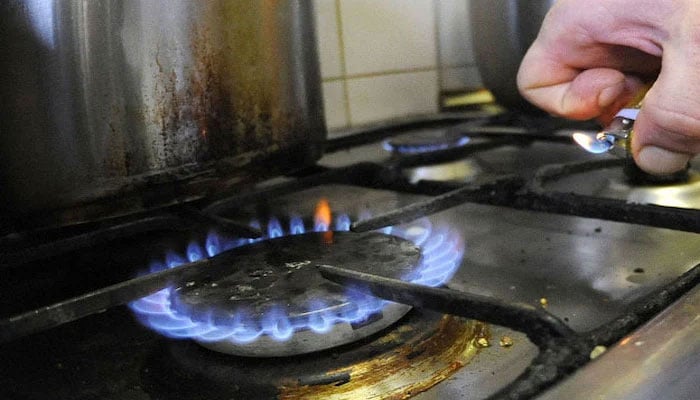Government’s endeavours to implement the Weighted Average Cost of Gas (WACOG) formula for determining gas tariff biannually by blending local and imported RLNG have hit snags  A person can be seen lighting a stove. — AFP File
A person can be seen lighting a stove. — AFP File
ISLAMABAD: The government’s endeavours to implement the Weighted Average Cost of Gas (WACOG) formula for determining gas tariff biannually by blending local and imported RLNG have hit snags.
Sindh chief minister opposed the formula, stressing the government should not take any decision which is against the Constitution. He argued Article 158 of Constitution needs to be implemented fully, a senior official of the Energy Ministry told The News.
Prime Minister Shehbaz Sharif on April 17 had constituted an 11-member committee. It comprises minister of petroleum as convener, minister for power, minister for industries as members, Power Division secretary, industries and production secretary and Captain (retd) Muhammad Mahmood as members. The four provincial chief secretaries are also members of the committee.
The committee was given seven days to report its findings and recommendations to prime minister about the introduction of WACOG in gas tariff with its positive and negative implications.
Currently, Ogra determines natural gas tariff for domestic sector consumers and LNG price separately for power sector. The federal government wants implementation of WACOG to bring down gas tariff for industrial (export and non-export) sector in Punjab, high-end domestic consumers and RLNG-based power plants.
In the first meeting of the committee, the Sindh chief minister opposed the endeavor of central government to enforce the WACOG, saying it would be the negation of Article 158 of Constitution. Sindh is of the view import of RLNG is solely for the Tier-II category of natural gas consumers. Under the ring-fenced tariff arrangements and the existing Tier-I, consumers of natural gas under WACOG base tariff could not bear the burden of high cost of imported RLNG.
KP and Balochistan also opposed it. The Article 158 says the province where the gas is produced has first right to use it, and the leftover gas will then be transported to the province where gas is less produced or not produced. The other federating units are of the view they have ample gas production for their needs. They say their gas is being purchased at lower prices but being sold to them at higher prices.
During the PTI regime in 2020, the official said, the same move for implementing WACOG mechanism in the gas tariff was initiated. At that time, the Sindh chief minister opposed it in a letter to the then prime minister Imran Khan that federal government’s endeavour was quite inappropriate and unconstitutional.
However, KP said in the meeting of 11-member committee, headed by Musadik Malik, the Sui gas companies, which are a part of the federal government, purchase the gas at $5 per mmbtu. The same is sold to the KP dwellers at average price of $7 per mmbtu, it said.
Similarly, Sindh also mentions the fact gas from the province is being purchased at $4.5 per barrel and being sold to them at $7 per mmbtu.
Sindh currently produces 61pc natural gas, followed by 21pc in Balochistan, 15pc in KP and 2pc in Punjab. The natural gas consumption stands at 44pc in Sindh, 34pc in Punjab, 15pc in Balochistan and 7pc in KP.
According to the initial working, the WACOG enforcement would cause an average tariff raise by over 91pc of domestic consumers to Rs2,300 per unit from Rs1,200 per mmbtu.
However, the gas tariff for industrial, including fertilizer and commercial sectors, is estimated to decrease by 25pc. The electricity power tariff would tumble by Rs1.80 per unit because of 25pc decline in the wake of blended gas supply to power sector if WACOG gets implemented.
The impact of 25pc decrease in gas tariff for power sector will reduce power tariff by just Rs1.80 per unit in basket tariff price, as power generation based on RLNG stands at just 5pc in total power generation. The total power generation is mix of electricity from nuclear, hydel, wind, bagasse, coal (local and imported) RLNG, furnace and diesel.












